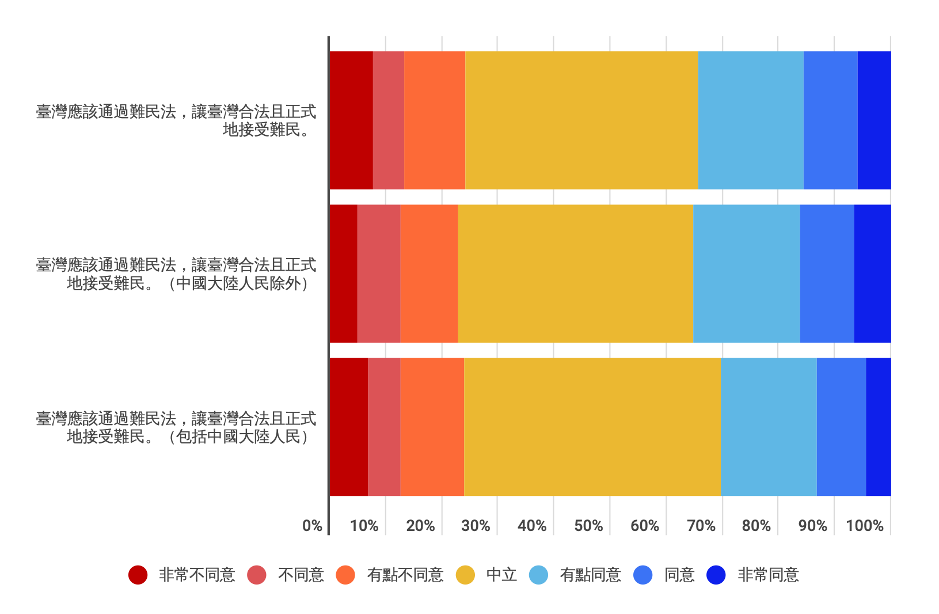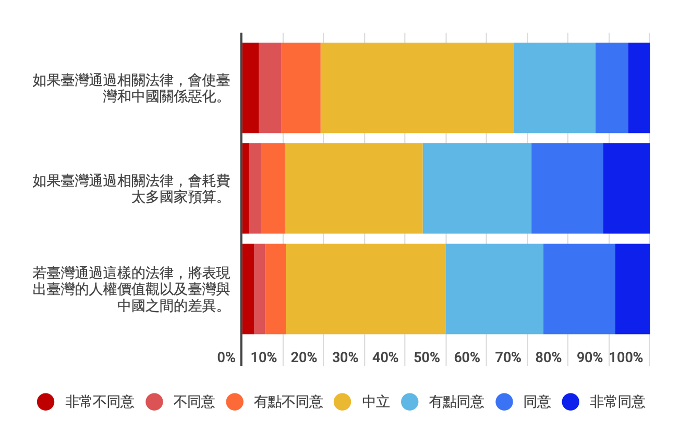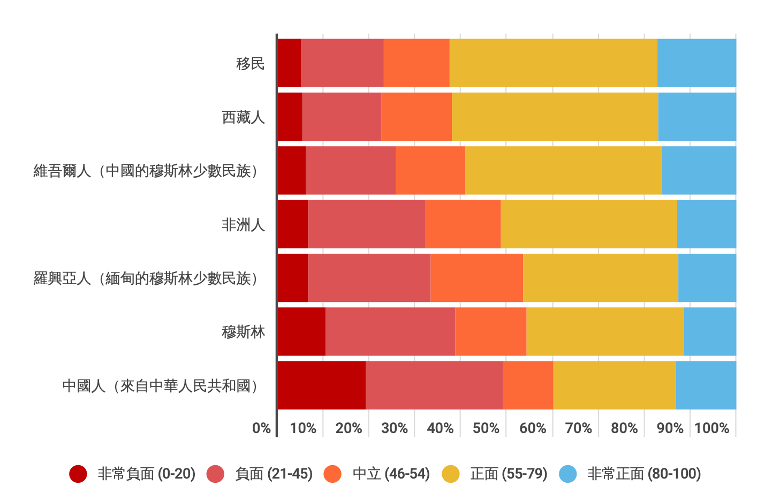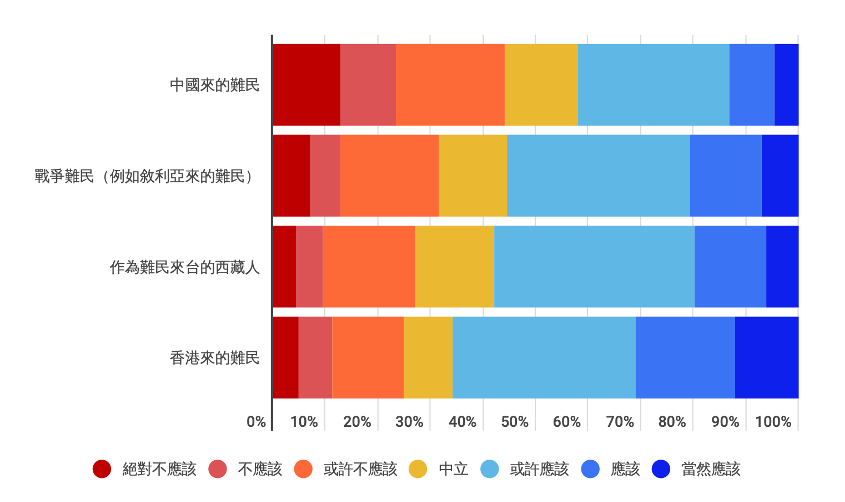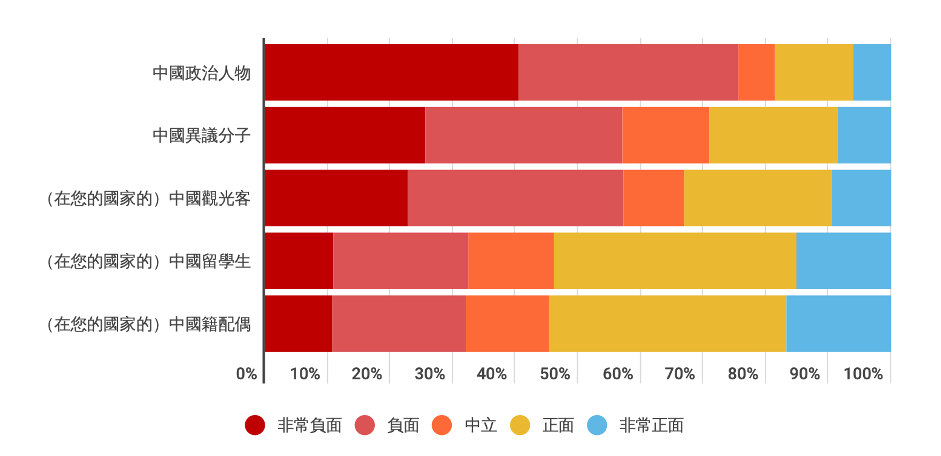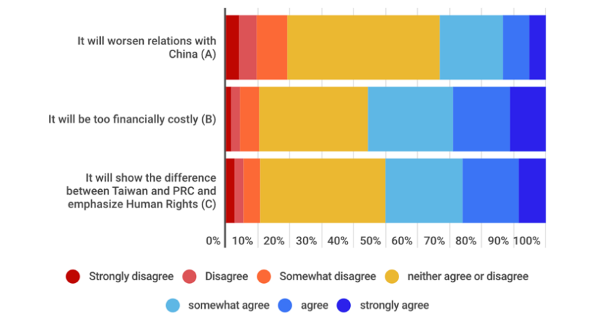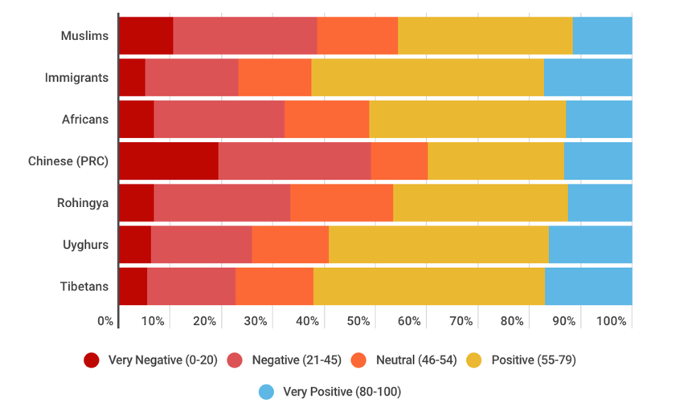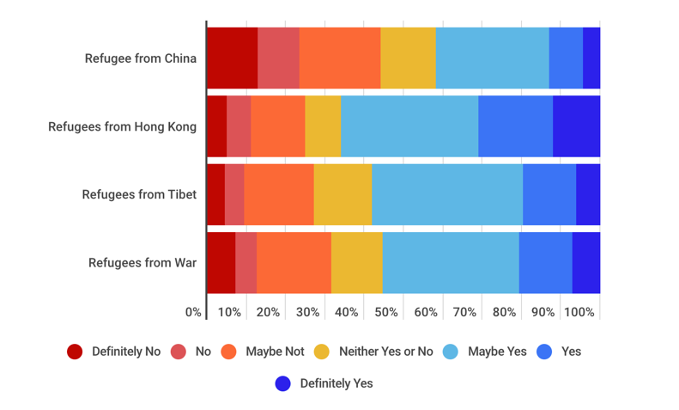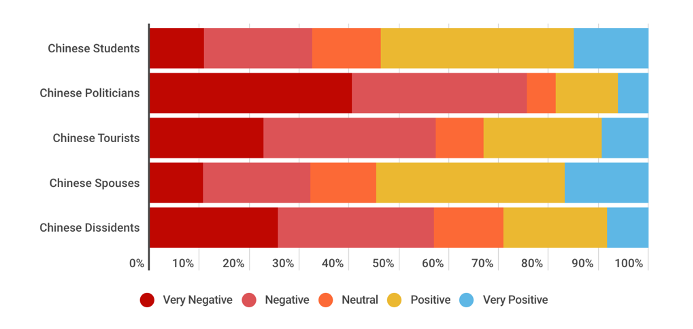作者:Dr. Kristina Kironska (柯蓉卡)
翻譯校稿:台權會秘書處
台灣被認為是亞洲最進步的國家之一,但卻缺乏難民法。由於台灣不穩定的政治地位以及和中國的複雜關係,這個議題事關重大。然而,讓局勢變得更加堪憂的是,台灣社會對此缺乏實質討論和社會對話。台灣民眾對於在本國通過庇護法規[1]有何看法?他們對難民的看法又是什麼?
台灣被認為是亞洲最進步的國家之一,但該國並沒有庇護法規。儘管台灣已經將國際條約國內法化,因而負有不遣返義務,但在沒有庇護制度的情況下,台灣無法處理來台尋求庇護的人。台灣已將其採納為國內法的國際人權公約執行情況國際審查委員,一再建議「迅速通過難民法,其中也應該包括不遣返原則」。然而,或許由於這是一個涉及兩岸關係的複雜問題,其進展十分緩慢。
由於其不穩定的政治地位,以及與中國的複雜關係,此一議題事關重大。然而,讓局勢變得更加堪憂的是,(除了在開始有大批香港人來台的2019年間,)台灣社會對此缺乏實質討論和社會對話,而政治精英們或許是有意維持此種狀態。
幾乎沒有具代表性的全國調查,了解民眾對於難民和可能之庇護政策的看法和態度;而非著眼於來台港人的廣泛調查更少。為什麼調查很重要?因為調查能夠好好窺見人們的看法。人們的看法也很重要,因為它們往往能現實世界產生影響。台灣政界人士甚依賴民意,尤其是涉及台灣與中國關係的敏感議題,討論台灣將制定庇護法規時,不可避免地會觸及本來就已經非常緊張的兩岸關係。
本文呈現了一項大規模的全國性調查結果——印度-太平洋華語邊境區域調查——並全面提供了台灣人在涉及流動人口(難民)和制定庇護法規的偏好。台灣的調查資料是由一家當地機構在 2022 年 5 月至 6 月期間,於網路上(以中文)收集資料。該樣本在年齡、性別和地區方面均具備全國代表性,共有 1,350 名受訪者。
就台灣可能發展的庇護機制,(受訪者被提供了三種不同的版本[1]:一般難民法;排除中國人民的難民法;以及包含中國人民的難民法,)贊成通過某種難民法的人略多於反對的人,但大多數人實際上對此沒有意見。這種缺乏立場的情形,反映出了台灣社會對庇護問題討論不足的現況。有趣的是,對這些不同版本的回答幾乎沒有差異:23%-24%的人不同意,30%-34%的人同意,而最大的部分——41%-46%的人既不同意也不反對通過庇護法規 (見圖1)。
圖1、人們對通過(不同版本)難民法的意見
在上述三個問題中,最主要的答案都是「既不同意也不反對」,這可以解讀為人們對這個問題並沒有明確的看法。除了人權價值觀問題,泛藍和泛綠支持者的回答幾乎沒有差別;更多的泛綠支持者(59%)比泛藍支持者(46%)同意通過難民法將可彰顯出台灣的人權價值觀,並展現出台灣和中國之間的差異。
如果台灣通過難民法,有33%的人認為台灣和中國的關係會惡化,19%的人認為不會,47%的人似乎沒有意見。如果台灣通過這樣的法律,有56%的人認為台灣國家預算的財政負擔會過高。另一方面,50%的人也認為,通過這樣的法律會彰顯出台灣與中國的人權價值差異(見圖2)。
圖2:人們對通過難民法後果的意見
受訪者對於絕大部分會受益於難民法的群體(無論是民族或宗教性質)——穆斯林、移民、非洲人、羅興亞人、維吾爾族人和藏族人——抱持好感。對於移民全體的觀感最為正面(63%),其次是對藏族人(62%),然後是對維吾爾族人(59%)。來自中華人民共和國的中國人是一個例外——受訪者對於他們的觀感是負面的(49%)。羅興亞人(在緬甸受迫害的少數民族)給予受訪者的印象雖然正面多於負面,但也是獲得持平答覆最多的族群(20%),這可能顯示他們在台灣較不為人知,因此人們往往沒有意見 (見圖3)。
圖3:人們對特定人群的感受——穆斯林、移民、非洲人、羅興亞人、維吾爾族人和藏族人
更具體來說,當被問及接受某些群體 / 國籍的難民時,台灣人對來自香港(66%)、西藏(58%)的人很有好感,對於來自其他國家的戰爭難民(55%)也相當友好,但對來自中國的難民(44%)卻表現得相當排斥(見圖4)。
圖4:民眾接收來自特定國家難民的意願——中國、香港、西藏和其他國家的戰爭難民
年輕人是受訪者中最不願意接收中國難民,但最願意接受香港人。普遍而言,男性比女性更願意接收難民,就接收中國人的意願而言,男性為48%女性為26%;就接收藏族人而言,男性願意接收難民的比例為 63%,女性為 53%。然而這些資料並未提供足夠的資訊來解釋原因。
整體而言,難民的被接受程度相當高,且泛藍族群更願意接受難民,特別是對於中國人(泛藍族群為57%,泛綠族群為42%),以及來自其他國家的戰爭難民(泛藍族群為63%,泛綠族群為49%)。有趣的是,並非泛藍或泛綠政治傾向的人們,對於是否接收難民似乎較沒有定見。
仔細觀察人們對中國各階層族群的態度 / 感受(見圖5),我們可以發現,人們對中國政客的批評最多(76%),令人驚訝的是,緊隨其後的是中國異議人士(57%),而對中國學生(33%)和中國籍配偶(32%)的批評最少。
圖5:對中國不同族群的感受
大多數台灣人(58%)甚至支持將羅興亞人——來自緬甸流離失所,目前生活在孟加拉國難民營的一支少數民族——重新安置到台灣,相較之下,持反對意見的人只有29%(見圖6)。顯然,年輕人比老年人更傾向於重新安置他們,而其中男性又略多於女性。
圖6:民眾對羅興亞人移居台灣的意見
雖然從資料中可以明顯看出,長期以來人們對庇護制度一直缺乏討論,但資料也顯示,人們更傾向於認同台灣需要一個適當的庇護制度,而非如目前一樣,必須以個案情況來處理入境的人。此外,除非對方來自於中國,台灣人對難民的看法是正面多於負面的,並且有意在台灣接收他們。
解讀這項調查的結果時,應該將 2022 年 5 月至 6 月收集資料當下的政治氛圍納入考慮,當時距離俄羅斯入侵烏克蘭只有幾週時間,入侵加劇了人們對於中國對台計劃的擔憂。台灣有許多人猜測,中國入侵台灣的可能性已然提升。由於擔心自己的未來,人們往往對被迫離開原屬國家到其他地方尋求庇護的人更富有同情心。
在此同時,接納中國人作為難民的意願降低了,這讓我們回到台灣和中國之間複雜關係的問題,並突顯出在接受任何解決方案之前都還需要進行社會對話,無論是容納或是排除中國公民的庇護制度。
Kristina Kironska是一位跨學科社會參與型學者,在台灣事務、中國-中東歐關係、緬甸研究、人權、選舉觀察和倡議都富有經驗。目前,她正在捷克帕拉茨基大學(Palacky University Olomouc)管理的華語區邊境地帶(Sinophone Borderland)專案進行研究。她也是中歐亞洲研究所的宣傳總監暨國際特赦組織斯洛伐克分會的董事。聯絡方式:k.kironska@gmail.com。
Taiwanese public opinion on asylum in 2022
Taiwan is considered to be one of the most progressive countries in Asia but has no asylum law. Due to its precarious political status and complicated relationship with China, there are serious concerns surrounding this topic. However, what makes the situation direr is the lack of substantial discussion and social dialogue on this in Taiwanese society. What do Taiwanese people think of passing an asylum law in their country and how do they perceive refugees?
Taiwan is considered to be one of the most progressive countries in Asia but has no asylum law. Although the country has accepted international human rights treaties as domestic law and thus has the obligation of non-refoulment, in the absence of an asylum system the island has not been able to handle people coming to Taiwan seeking protection. The International Review Committee on the Implementation of the International Human Rights Covenants (that Taiwan has adopted as domestic law) has repeatedly recommended a “speedy adoption of a Refugee Act, which should also include the principle of non-refoulement“. There has, however, been little progress, likely because it is a complex issue involving cross-strait relations.
Due to its precarious political status and complicated relationship with China, there are serious concerns surrounding this topic. However, what makes the situation direr is the lack of substantial discussion and social dialogue on this in Taiwanese society (with the exception in 2019 when Hong Kongers started arriving en-masse to Taiwan) and the political elites have perhaps purposely kept it that way.
There have been only very few nationally representative surveys on people’s perceptions and attitudes toward refugees and toward a hypothetical asylum policy, and even less that would have a broader focus than on people arriving from Hong Kong. Why are surveys important? They give a good glimpse into people's perceptions. And taking people’s perceptions into consideration is important because they often have real-world implications. Taiwanese politicians heavily depend on public opinion, especially on sensitive topics that involve Taiwan’s relationship with China, and discussing a potential asylum law in Taiwan inevitably touches on Cross-Strait relations, which are already very tense.
This article presents the results of a large-scale nationally representative survey – the Sinophone Borderlands Indo-Pacific Survey[1] – and provides a comprehensive picture of Taiwanese people’s preferences when it comes to people on the move (refugees) and a potential asylum law. The Taiwanese part of the survey data was collected online (in Mandarin Chinese) between May and June 2022 by a local agency. The sample is nationally representative in terms of age, gender, and regions, with 1,350 respondents.
Regarding potential asylum mechanisms in Taiwan, slightly more people agree than disagree with having to pass some kind of a refugee act (the respondents were provided three different versions - a general refugee act, a refugee act that would exclude Chinese nationals, and a refugee act that would include Chinese nationals), but most people actually do not have an opinion on this. This lack of stance reflects the lack of discussion about asylum in Taiwanese society. Interestingly, there was barely any percentual difference in the answers to these different versions: 23–24% agreed, 30–34% disagreed, and the largest part, 41–46%, neither agreed nor disagreed with adopting an asylum law (see Chart 1).
Chart 1: People’s opinion on adopting (different versions of) an asylum law

If Taiwan were to pass an asylum law, 33% of the people believe it would worsen relations between Taiwan and China, 19% believe it would not, and 47% do not seem to have an opinion. If Taiwan passed such a law, 56% of the people believe it would be too financially costly for the Taiwanese state budget. On the other hand, 50% of people also believe passing such a law would highlight the human rights values of Taiwan and the difference between Taiwan and China (see Chart 2).
Chart 2: People’s opinion on the consequences of passing an asylum law
In all of these three questions above, the dominant answer was ‘neither agree nor disagree,’ which can be interpreted as people not really having clear opinions on the issue. There was almost no difference between the answers of pan-blue and pan-green supporters, except for the human rights values question, where more green supporters (59%) agreed than blue supporters (46%) that adopting an asylum law would highlight the human rights values of Taiwan and show the difference between Taiwan and China.
When it comes to people, the potential beneficiaries of an asylum law in Taiwan, most groups (whether ethnic or religious) – Muslims, Immigrants, Africans, Rohingya, Uyghur, and Tibetans – were viewed rather positively, with immigrants in general viewed most positively (63%), followed by Tibetans (62%), and then Uyghurs (59%). Chinese people from the PRC constitute an exception – they are viewed negatively (49%). The Rohingya (a persecuted minority from Myanmar), while they are viewed more positively than negatively, they have the most neutral answers of all (20%), which may indicate they are not very well-known in Taiwan, and people thus tend not to have an opinion (see Chart 3).
Chart 3: People’s feelings toward selected groups of people – Muslims, Immigrants, Africans, Rohingya, Uyghur, and Tibetans
More specifically, when asked about accepting certain groups/nationalities of refugees, Taiwanese people were very favorable toward people from Hong Kong (66%), Tibet (58%), but also toward war refugees from other countries (55%), but again rather unfavorable toward refugees from China (44%) (see Chart 4).
Chart 4: People’s willingness to accept refugees from selected countries – China, Hong Kong, Tibet, and war refugees from other countries
Young people are the least willing to accept Chinese refugees, while they are the most willing to accept Hong Kongers. In general, men are more willing to accept refugees than women, in the case of Chinese, 48% of men in comparison with 26% of women; and in the case of Tibetans, 63% of men in comparison with 53% of women. The data does not provide enough information as to why.
Overall, the acceptance rate of refugees is quite high, with blue-leaning people more willing to accept refugees, especially in the case of Chinese (57% of blue-leaning vs. 42% green-leaning), but also war refugees from other countries (63% blue-leaning vs. 49% green-leaning). Interestingly, people without blue or green political leaning seem to be less decided whether to accept refugees or not.
Looking closer at people’s attitudes/feelings towards various segments of Chinese people (see Chart 5), we can see that people are most critical of Chinese politicians (76%), surprisingly followed by Chinese dissidents (57%), and the least critical of Chinese students (33%) and spouses (32%).
Chart 5: Feelings toward different groups of Chinese people
Most people in Taiwan (58%) even support the resettlement of the Rohingya people – a displaced minority from Myanmar, currently living in refugee camps in Bangladesh – into Taiwan, in comparison to 29% of people who are against it (see Chart 6). Very clearly younger people were more inclined to resettle them than older people, and men a little more than women.
Chart 6: People’s opinion on resettlement of the Rohingya people to Taiwan
While it is apparent from the data that there has long been a lack of discussion about asylum, the data has also shown that people tend to rather agree that Taiwan needs a proper asylum system and not handle incoming people on a case-by-case basis as has been done until now. Also, refugees are seen rather positively than negatively, with people from China as an exception, and Taiwanese people are willing to accept them in Taiwan.
The results from this survey should be understood in the context of the political climate in which the data have been collected – between May and June 2022 – which is only a few weeks following the Russian invasion of Ukraine, which has fueled concern over China’s plans for Taiwan. Many in Taiwan speculate that the odds of an invasion by China have increased. With such fears of their own future, people tend to be more compassionate toward other people who are forced to leave their country of origin and seek refuge elsewhere.
At the same time, the lower willingness to accept Chinese people as refugees brings us back to the issue of complicated relations between Taiwan and China and highlights the need for social dialogue before any solution – whether an asylum system including or excluding Chinese nationals – is accepted.
Kristina Kironska is a socially engaged interdisciplinary academic with experience in Taiwan Affairs, CEE-China Relations, Myanmar Studies, human rights, election observation, and advocacy. Currently, she is conducting research within the Sinophone Borderlands project administered by Palacky University Olomouc. She is also the Advocacy Director at the Central European Institute of Asian Studies, and Board Director of Amnesty International Slovakia. She can be reached at: k.kironska@gmail.com.
[1] Turcsányi, Richard Q., Kristina Kironska, Alfred Gerstl, Monika Arnez, Jiří Čeněk, Julie Chen, Rosalie Chen, Andrew Chubb, Peter Gries, Tao Wang. 2022. “Sinophone Borderlands Indo-Pacific Survey.” Palacky University Olomouc.
[1] 在研究設計上,受訪者被分成三組,隨機地被詢問略為不同版本的難民法內容。
[1] 在這篇文章中,作者是使用「庇護機制」、「庇護法規」。需要說明的事情是,在問卷調查時基於大眾比較熟悉的名詞推估可能是「難民法」,因此是用「難民法」詢問。

